

Eac. Genealogy. Context. Lost in the Archives - ChronicleReview.com. Blog Archive » “This is not something society grows out of. It’s. I’ve had something filed away to write about it, and this seems like an appropriate time.
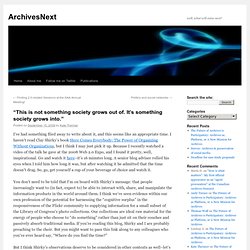
I haven’t read Clay Shirky’s book Here Comes Everybody: The Power of Organizing Without Organizations, but I think I may just pick it up. Because I recently watched a video of the talk he gave at the 2008 Web 2.0 Expo, and I found it pretty, well, inspirational. Go and watch it here–it’s 16 minutes long. A senior blog adviser rolled his eyes when I told him how long it was, but after watching it he admitted that the time doesn’t drag. So, go, get yourself a cup of your beverage of choice and watch it. You don’t need to be told that I’m on board with Shirky’s message: that people increasingly want to (in fact, expect to) be able to interact with, share, and manipulate the information products in the world around them.
Obama Campaign Launches Document Archive On Scribd. Vintagephoto: Execution of the Four Persons Condemned. Execution of the Four Persons Condemned as Lincoln assassination Conspirators (Mary E.
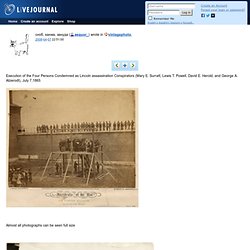
Surratt, Lewis T. Powell, David E. Herold, and George A. Atzerodt), July 7,1865 Almost all photographs can be seen full size. Blog Archive » Notes from Spring MARAC meeting: MPLP, Friend or. Next up in the discussion sessions at the spring MARAC meeting was one on the impact of the article “More Product, Less Process: Revamping Traditional Archival Processing” (hereafter “MPLP”) by Mark A.
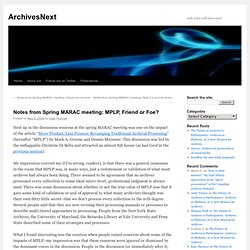
Greene and Dennis Meissner. This discussion was led by the unflappable Christine Di Bella and attracted an almost full house (as had Geof in the previous session). My impression (correct me if I’m wrong, readers), is that there was a general consensus in the room that MPLP was, in many ways, just a restatement or validation of what most archives had always been doing. There seemed to be agreement that no archives processed every collection to some ideal micro-level; professional judgment is always used. There was some discussion about whether or not the true value of MPLP was that it gave some kind of validation or seal of approval to what many archivists thought was their own dirty little secret–that we don’t process every collection to the n-th degree. Be Sociable, Share! Vietnam Veterans Memorial (The Vietnam Wall) : Footnote.com. Pre-Edison Audio Gives BBC Host the Giggles.
Blog Archive » Top ways archives are different from libraries. I’m working on a writing assignment about archives and technology and, as is so often the case, I need to discuss how archives and libraries are different.
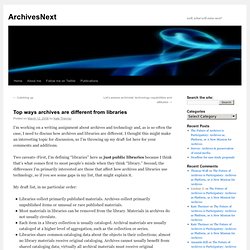
I thought this might make an interesting topic for discussion, so I’m throwing up my draft list here for your comments and additions. Two caveats–First, I’m defining “libraries” here as just public libraries because I think that’s what comes first to most people’s minds when they think “library.” Second, the differences I’m primarily interested are those that affect how archives and libraries use technology, so if you see some gaps in my list, that might explain it. My draft list, in no particular order: Libraries collect primarily published materials. I could probably come up with some others, but the list seems to be getting a bit long. Be Sociable, Share!
The winners: 2008 Best Archives on the Web Awards. Yes, the votes have been tallied, and it’s time to announce the winners of the first annual Best Archives on the Web Awards.
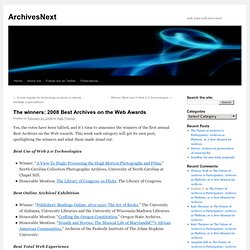
This week each category will get its own post, spotlighting the winners and what them made stand out. Best Use of Web 2.0 Technologies Winner: “A View To Hugh: Processing the Hugh Morton Photographs and Films,” North Carolina Collection Photographic Archives, University of North Carolina at Chapel Hill.Honorable Mention: The Library of Congress on Flickr, The Library of Congress. Best Online Archival Exhibition. Secret Police Files and the Vocies of the Dead. Over the past couple of decades we have witnessed a burgeoning of interest in the truth commissions and the records they generate and use.
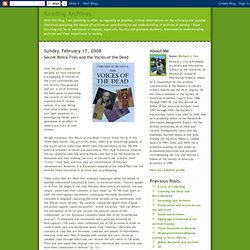
A lot of attention has been given to examining the records of secret police organizations in various nations. It is only fitting that some scholars would turn their attention to investigating earlier police operations in an effort to understand more of their victims. Hiroaki Kuromiya, The Voices of the Dead: Stalin’s Great Terror in the 1930s (New Haven: Yale University Press, 2007) is an interesting analysis of the Soviet secret police (the NKVD) piles files pertaining to the 700,000 political prisoners arrested and executed in 1937-1938.
Blog Archive » Blogging about doing archival work. When I wrote my first posts about the archival blogosphere (or lack thereof) and did an inventory of archival blogs, I made a decision to leave out blogs that primarily featured highlights from an institution’s collections or discussion about day to day processing work.
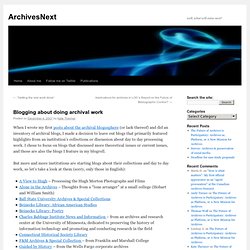
I chose to focus on blogs that discussed more theoretical issues or current issues, and those are also the blogs I feature in my blogroll. But more and more institutions are starting blogs about their collections and day to day work, so let’s take a look at them (sorry, only those in English): That’s a pretty healthy list, and I’m sure that each blog is providing value for its own institution, but what are they doing for the archival profession as a whole? Each of these sites is making the collections and work of their own institutions more widely known, and by extension, promoting archives in general to the web audience.
Another way to use these sites would be to have a way to randomly generate an “archives of the day.”